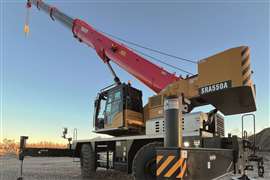Confidence still growing in Europe's rental sector
21 January 2014
The improving confidence level of Europe’s rental business has been sustained in the final quarter of 2013, according to the latest ERA/IRN RentalTracker survey conducted at the end of December.
The latest results confirm the positive finding of the third quarter survey, although with some significant differences, including a positive shift upwards in confidence levels in the Benelux and, in contrast, a general weakening of confidence levels among multinational rental companies.
Taking Europe as a whole there were improvements in all of the confidence measures, covering employment intentions, expectations for the future, time utilisation trends and quarterly activity year-on-year.
The ERA/IRN RentalTracker survey is conducted every quarter by International Rental News (IRN) and is a joint venture with the European Rental Association (ERA). More than 175 companies in Europe responded to the survey this quarter.
The general improvement masks changes in individual countries and among companies of large size. Most notable is an improvement in the Benelux region (Netherlands, Belgium and Luxembourg), where results improved in all the measures, except for investment plans this year which remain modest.
There was a weakening of confidence levels among multinational companies, with a downgrading of investment plans and a fall in the proportion of businesses reporting rising utilisation levels in the final quarter of the year.
Multinationals remain among the least optimistic looking ahead a year – only French and Italian companies had fewer respondents forecasting ‘much better’ business conditions 12 months from now. Multinationals were also among those close to the bottom of the league in terms of revenue growth in the final quarter.
It is not immediately clear why there has been this downward shift in confidence levels at multinationals. It is possibly linked to the announcement by Ramirent recently that it had experienced a weakening in some Nordic markets in the final quarter of 2013. It should also be noted that the sample of multinationals in the survey is relatively small, fewer than 20.
Meanwhile, the resurgence in confidence levels in the UK was maintained, with the UK in the top two of all the measures, with the exception of the employment question, where UK companies were slightly below the European average, with just 26% expecting to add staff in the first quarter of this year.
Overall, though, the Q4 survey makes for positive reading. On revenues levels for the full year 2013 there was a +24.7% positive balance of opinion (that is, the difference between the proportion reporting higher revenues less the proportion seeing lower sales). The positive balance was even higher for the final quarter, increasing to +33.1% - with 50% reporting higher year-on-year revenues in the period – which is the highest for more than two years and significantly more than at the end of the third quarter.
The improving trend evident for the five previous quarters for the balance of opinion for ‘current business levels’ also continued at the end of December, with a positive balance of +16.6%, up from +13.4% at the end of the third quarter and the highest level since the second quarter of 2011.
Likewise, there was a continued increase in the time utilisation trend, with a positive balance of opinion at +35.0%, the highest since the start of 2011. Only 13% of all respondents were reporting declines in utilisation rates in the final quarter of 2013 and almost 50% were seeing increases.
There was, however, little sign of improvement in Europe’s more troubled markets. Italy and Spain both remain near the bottom of most of the confidence measures – none of the Spanish respondents (an admittedly small sample) were planning to increase employment in the first quarter of 2013 and it is depressing that there remains a negative balance of opinion on activity levels for the full year 2013 and the final quarter of the year.
Italy remains in a rather stagnant situation, with an enormous -45% negative balance of opinion on current business conditions at the end of the year. Not one of the Italian respondents said that business conditions would be ‘much better’ 12 months from now.
France was also seeing a continuation of the subdued confidence levels from the previous quarter. They were among the least optimistic looking ahead – just 3.7% expected business to be ‘much better’ in a year’s time – and could only muster a neutral balance of opinion on current business conditions.
However, more positive were French responses to the utilisation question, with almost 50% reporting improving rates at the end of 2013, equal to the average for the whole of Europe. Around 31% of French companies expect to increase fleet investment this year, which is much higher than the 6% recorded at the end of September last year.
Nordic companies reported almost unchanged levels of confidence from the previous quarter, which means at or around the European average in most measures, although they are notably subdued on the question of business levels 12 months from now.
Multinational rental companies – who have generally been leading the optimism charts in recent years – seem less buoyant now. They were the least likely to report increasing utilisation at the end of 2013, and in the bottom three when it came to forecasts for a year in advance and in reporting fourth quarter growth. Some 32% expect to increase investment by at least 10% this year, which is above the average, but down on the 50% of previous quarter.
Russia and the UK remain two of the most positive markets, particularly the UK, where 89% were reporting rising utilisation levels and half were expecting to increase investment by more than 10% this year. Almost 85% of UK companies reported higher revenues year-on-year for the final quarter of 2013.
Companies in the Benelux also seem to have turned a corner. They are among the most bullish on employment intentions – 43% will employ more in the first quarter of 2014 – and they were second only to the UK in reporting rising utilisation levels.
Significantly, there was a big jump in Benelux companies’ positive balance of opinion on current conditions, increasing from +13% at the end of the third quarter to +50% at the end of the year.
The missing piece of the jigsaw this quarter is Germany, with insufficient results to provide meaningful figures. We hope to put that right for the next survey.
Overall there was the usual mixed bag of results, reflecting the differing conditions throughout Europe. Even so, the industry can take comfort from the fact that the trends are in the right direction; not for every country, perhaps, but definitely for the region as a whole.
The full graphical analysis of the results will appear in the February-March issue of IRN.






